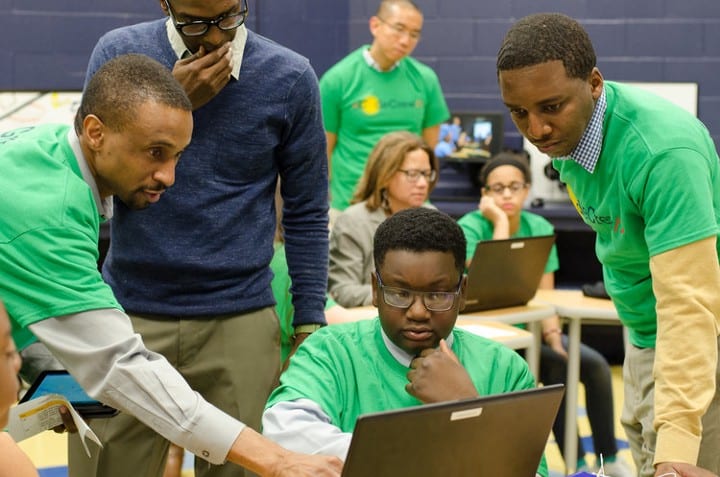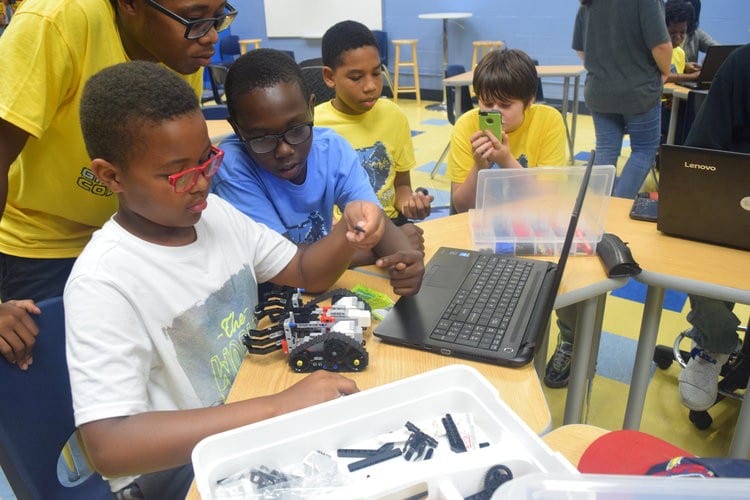When Code Crew launched in Memphis in 2015, the company set out to emphasize diversity in tech while exposing local students to computer science — and it did not hesitate to pay a living wage to all its employees.

When Meka Egwuekwe (MUH-kuh EG-woo-ek-KWAY) co-founded the organization with Audrey Jones, Petya Grady and the Memphis Grizzlies Foundation, he wanted to attract high-quality employees eager to impact the lives of youth through computer science.
“We don’t call it a living wage; we just think it’s the right thing to do,” Egwuekwe said. “We’re fortunate to be in a field that it’s in high demand, and schools want the opportunities and they have budgets set aside for it.”
A living wage, roughly calculated at $15 an hour, is a major start toward reducing the main side effect of low wages — poverty, according to Elise Gould, senior economist at the Economic Policy Institute in Washington, D.C. Making the practice into a norm requires a concerted effort between local, state, and federal governments establishing a foundation for a minimum wage that provides a quality of life that can cover the cost of living and in line with current economic growth rates.
A living wage, roughly calculated at $15 an hour, is a major start toward reducing the main side effect of low wages — poverty.
Code Crew’s 25 part-time employees include teaching assistants who are primarily computer science majors at local universities like the University of Memphis and Christian Brothers University. Two full-time instructors, lead mentors, earn a much more competitive wage because of their experience as professional software developers.
Damian McKinley, who started as a part-time classroom assistant and now is a full-time employee, notes that earning $15 an hour reduced the stress of going to college and working at the same time.
“It gives a college student a backbone, something to rely on. That’s what most college students are worried about: income. A living wage gives you more time to focus on school,” said McKinley.
In a classroom environment, lead mentors use programming skills to expose 250 students throughout Memphis, including communities like Binghampton and Germanshire.
“For the in-school electives, kids see our instructors four or five days per week and have quizzes, tests and homework like any other elective class,” Egwuekwe said. “For our after-school programs, they spend 90 minutes one day a week for the most part. Topics range from mobile apps, web development, video games, robotics, and drone programming. Virtually every class entails about three-quarters of the time learning skills, and a fourth at the end doing their own projects.”
For many minimum wage workers working in Memphis, a living wage could be the catalyst for lifting them out of poverty — a hard reality for many living in this city.
More than 18 percent of people are in poverty in the Memphis area, which includes parts of Arkansas, according to Dr. Elena Delavega, a sociologist at the University of Memphis. It’s well-known Memphis’ child poverty rate is high — 28.8 percent. For blacks, 26 percent are in poverty, compared with 33 percent of Latinos and 9 percent of whites.
“That’s the connection some people don’t get,” Gould said. “Many people that are in poverty are working, and if many of them are making a living wage, they can work their way out of poverty.”
“That’s the connection some people don’t get,” Gould said. “Many people that are in poverty are working, and if many of them are making a living wage, they can work their way out of poverty.”
A wage of $13 an hour would take care of food, transportation and housing for a single individual in Memphis, according to EPI’s family budget calculator. A more substantial wage of about $19 an hour would be needed for those supporting at least one child, Gould said.
For Code Crew’s staff, earning a living wage is just part of “crafting the accountable professional,” Egwuekwe said.
“Number 1, people show up,’ he said. “We call ourselves a tech mentoring program and mentoring 101 is you must be present.”
For McKinley, working for Code Crew inspired him to be a better teacher and gave him an opportunity to be a full-time employee after he graduated.
“Watching the instructors and teaching the classes and being a teaching assistant, I was able to get questions from students about what they didn’t like and what they did like,” he said. “I was able to pick up on things because I’ve learned so much and I could see myself teaching for Code Crew.”

In one of the poorest cities in the nation, the organization offers an opportunity to improve the quality of life for Memphis tech professionals seeking to excel in their career and inspire the lives of kids through mentoring and computer programming. And teaching grade school students computer programming has been widely hailed as a career path and a way to understand and unpack complex problems, a skill that can be applied in any field or discipline.
“Today you are seeing companies making record profits and paying to shareholders,” Egwuekwe said. “Why can’t they pay less to shareholders and share with their workers so that they can live? If someone works 40 hours at Wal-Mart and have to get on public assistance that’s not the kind of company I want. You should be able to spend time with your family and enjoy them.”
This article first appeared on MLK50: Justice Through Journalism.